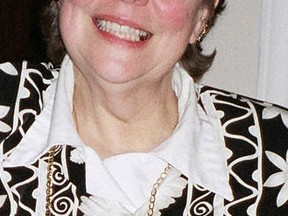The World is a Stage

Article content
Next week, October 25, 1784, will bring the 230th anniversary of the grant ‘our Sovereign Lord, George The Third’, gave to the Mohawk and others of the Six Nations, who had either lost their settlements within the Territory of the American States, or wished to retire from them to the British - ‘wish to settle in that quarter, to take possession of and settle upon the Banks of the River commonly called Ouse or Grand River, running into Lake Erie, allotting to them for that purpose six miles deep from each side of the river beginning at Lake Erie and extending in that proportion to the head of the said river, which them and their posterity are to enjoy for ever.’ (Excerpts from The Haldimand Treaty of 1784.)
The British Government at that time recognized the plight of the native North Americans who had be systematically driven from their lands with the drive of the Europeans setting in the United States and who had stood beside them as allies during the U.S. Revolution. They granted the natives this large tract of land as a reward, a refuge and a home.
While researching I came upon a section of this land, called the Burtch Tract which was involved in my own family history, for I am a descendent of the Burtches which owned this land.
Edee Burtch lived in New York State with his wife Maria Becker, but was loyal to Britain and fought with them against the U.S. rebellion for seven years. As the war went on, and it became apparent they were going to lose, the British went back to Long Island Connecticut where he was evacuated with troops on one of the last ships going to Nova Scotia.
Unfortunately Edee found no place to settle in Nova Scotia or New Brunswick, so after a couple of years he went back through Maine and ended up in the Mohawk Valley trying to find a home. He was found in 1791 in the Fishkill, New York census with wife Maria and child, David.
By 1797 he was safe in Ontario and by 1801 is census for Louth Co, near Welland. He is a pathmaster which is someone who maintains the roads. Thus far he had been in the areas of Canada where the best land was taken. So, they made their way by boat along the shore of Lake Erie to the Grand River and headed north. He landed at a spot which became known as Burtch Landing but later changed to and is known today as Newport.
The land was good and in 1806, Edee made a deal with Chief Brant, that by cutting and hauling boards and giving 500 bushels turnips, he was given a 99 year lease on 200 acres of excellent property on the Grand River. To cement the deal Edee also had to give one peppercorn. It was here, that he could finally settle and raise his large family including my several times great grandmother, Olive.
Chief Brant set aside several tracts of land for the white man, one named Burch Tract, the other at this time was Mt. Pleasant tract. The main reason was to get some much needed revenue into the native coffers. In fact, Edee’s brother Stephan followed him north and, for fighting with the British, received 200 acres in the Mt. Pleasant tract. He donated some of his land for the cemetery and church.
One of Edee’s sons, Absolone, plied the ferry across the Grand River at Burtch’s Landing. It was a busy time with all the settlers coming in and the beginnings of a Road which would eventually go through Southwestern Ontario. Everyone had to cross the river.
Son David farmed with his father, but Absolone wanted to add land to the original farm in Burtch’s Landing. Unfortunately a hand shake to cement a deal provided no proof a few decades later after Edee and Chief Brant had died. There was no written lease agreement, at least if there was, it was lost. People did testify they were present at the time of the agreement, however the whole situation soured and Absolone and most of the family departed to Oxford on the Thames which later became Ingersoll and Woodstock areas.
Three of Edee’s son, Zachariah, Levi and Daniel Burtch and their families travelled to the Woodstock area from New York State. They came by way of Brantford and then on to the Princeton district where they stayed in the Horner settlement for a few days before tackling the arduous trek through
thick bush and swamp to Oxford (now Woodstock). It took the Burtch brothers three days to clear a trail through the dense woods and travel the 12 miles to the place where they were to make their new home.
Zachariah Burtch built a log cabin in the early 1800s on the eventual site of the first YM-YWCA. It was the first home to be erected on the Town Plot of Oxford.
This time period in our history is amazing. Families seeking land and peace come from the United States and are the founders and forgers of communities. It is also heart-breaking when you learn how quickly our forefathers and governments sliced away the land. Little is left of land King George granted his native allies.